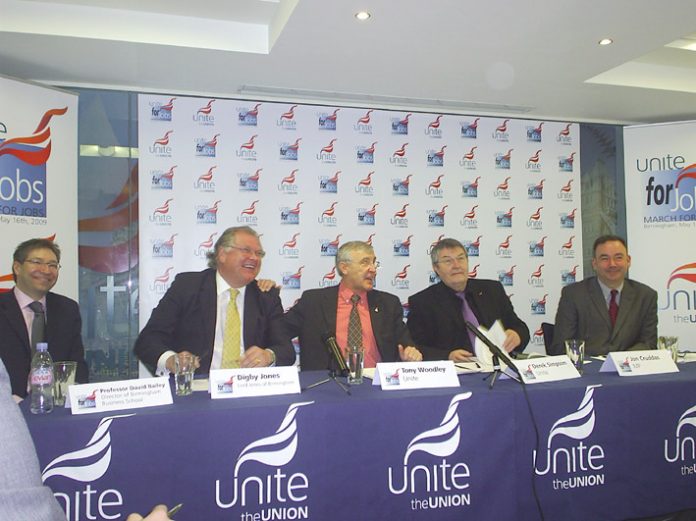
THE car industry in Britain is facing ‘Armageddon’, with GM Vauxhall set to close by the end of April unless it gets immediate financial assistance, Unite trade union leader Tony Woodley said yesterday.
Speaking at a press conference alongside the former CBI bosses’ leader Lord Digby Jones, at Unite’s headquarters in London, Woodley said that the rescue plan just put forward by General Motors ‘didn’t make one single dollar allowance for General Motors Europe’.
Dealing with US President Barack Obama’s announcement that he was putting GM on 60 days’ notice of bankruptcy, Woodley said that if GM collapses, ‘the chances of GM Vauxhall surviving is nil’.
He said crisis talks were taking place between the government and GM Vauxhall, which is asking for an immediate cash injection of £600 million, alongside a rescue package being discussed with several European governments amounting to around $3.2 billion.
‘Negotiations have been ongoing,’ Woodley said, adding that if GM Europe doesn’t receive emergency funding by the end of April, ‘it will run out of money’.
Unite said it was coming together with car bosses, academics and politicians to organise a joint march for jobs through Birmingham on May 16.
Digby Jones – who quit his job as an unelected government minister after admitting that he would not vote Labour – said he would be on the march.
‘Watch Digby march!’ he told reporters, adding that urgent assistance for motor manufacturing is needed to ‘save our nation’.
‘This is quite a unique press conference,’ said Woodley, launching the ‘Unite for Jobs’ march in May.
‘To my right, Lord Digby Jones, as you’re well aware, was recently the CBI chief responsible for trade and industry for the government in the Lords and a major stalwart of industry.’
Also present was Labour MP Jon Cruddas, whose Dagenham constituency contains the Ford diesel engine plant, and Professor David Bailey, from the Birmingham University Business School.
‘For the first time in my lifetime we bring together very senior industrial, academic, political and union representatives, all speaking with one voice. We’re uniting for jobs,’ Woodley said.
He said that ‘dozens and dozens’ of manufacturing companies were already folding, adding: ‘One very important components company is going into receivership later today.
‘This is the reality of the world we are living in and facing today.’
A Unite press statement launching the ‘Unite for Jobs’ campaign and May 16 demonstration in Birmingham, said that among the demands that the campaign would call for are:
• ‘The urgent implementation of a temporary short-time working compensation scheme to save the jobs of hundreds of thousands of skilled workers and sustain our manufacturing base in the immediate term.
‘A joint proposal from the TUC and the Federation of Small Businesses (FSB) estimated that a £1.2 billion package of wage subsidies would save some 600,000 jobs.
• ‘Speedier access to credit from the banks, again to ensure immediate support for manufacturing businesses.’
Woodley and his joint Unite general secretary Derek Simpson and ex-CBI chief Jones went on to spell out their joint demand for short-time working.
Woodley said: ‘Compare our country with any European country which has actually got in place short-time working compensation schemes and scrappage schemes and are maintaining their skills base for the upturn.’
The Unite document ‘Short Time working in the UK’ states: ‘While we would expect the employer to meet the bulk of the costs of short-time working, it is recognised that there will be business reasons why this cannot always be achieved.’
The union adds: ‘In such circumstances, Unite would look to the government to provide a funding mechanism(s) to offset the losses which workers would otherwise suffer.’
Lord Digby Jones said it took a ‘millisecond’ for him to say yes to joining the campaign.
He added: ‘We’re at one minute to midnight’ for the complete winding up of the car industry. Jones said a two-day week without loss of holiday, sick pay and pension entitlements could save the skilled workforce in the car industry for ‘better’ times, although those workers would still be losing four days’ pay.
Unite is opposed to resisting wage cuts and plant closures with strike action or occupations to demand their nationalisation.
Instead they are to campaign with the bosses for short-time working and a two-day week.